9 life hacks for a successful PhD (or other knowledge work)
Doing a PhD is not easy and there will be many times where you just want to quit. We’ve all been there. This makes it extremely important to make the process as easy and straightforward for yourself as possible. Here, I collected 9 hacks (I think they are more than just tips) that really helped me succeed at my PhD and that you might not have thought about. These will also be helpful for any other type of “brain work” like doing a Postdoc or working in the software industry. Let’s dive right in!
Hack 1 - Get some really large hard drives
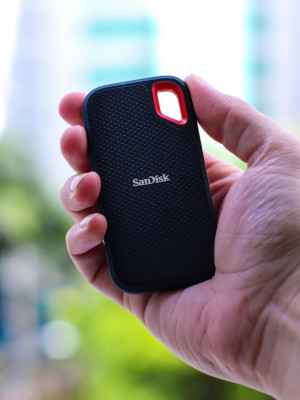
During your PhD, you will need to store loads of data and you can absolutely not risk loosing any data. Data loss often occurs when you quickly need to free up space in order to store a new dataset. Do yourself a favor and free yourself from this risk (and the time it needs to figure out what data you can remove to make space) by getting a large hard drive for your laptop. Large and fast SSDs are absolutely affordable now (potentially your employer will also pay for this!), so go ahead and get one, like this 4TB internal SSD. Note: this is an affiliate link, by buying it through that link, you help me maintain this blog =)
In addition, get yourself a large external hard drive where you do regular backups. Apart from an online backup tool like OneDrive or pcloud, I’d recommend to to regular “hard copy” backups. The external hard drive should have the same size as your internal one. I am using this one.
Hack 2 - Use the Pomodoro technique
During a PhD you’ll likely have to work on many different highly complex projects. The Pomodoro technique will help you to improve focus and memory. It’s very simple - you divide your work day into 30 min work periods followed by a 5 min break and doing that over and over again. Naturally, you can adapt these times as you desire. In the 30 minutes, you focus on ONE thing only. The benefits are that you force yourself to focus on that one thing and not switch around (multi-tasking is bad!) and you also force yourself to take regular breaks, which you should use to move around, drink water, and rest your eyes and brain.
There is an additional perk: We tend to memorize things better at the “edges” of a work unit, i.e., right what we do at the beginning at right at the end, because the brain can anchor these things better. Forcing yourself to take breaks creates more of these “edges”.
There are numerous free tools to time your “pomodoros”. I am using Pomotroid as I am writing this post, having another 17 minutes before I will take my next break. Of course, if you’re really in the flow, you can always skip a break and keep going.
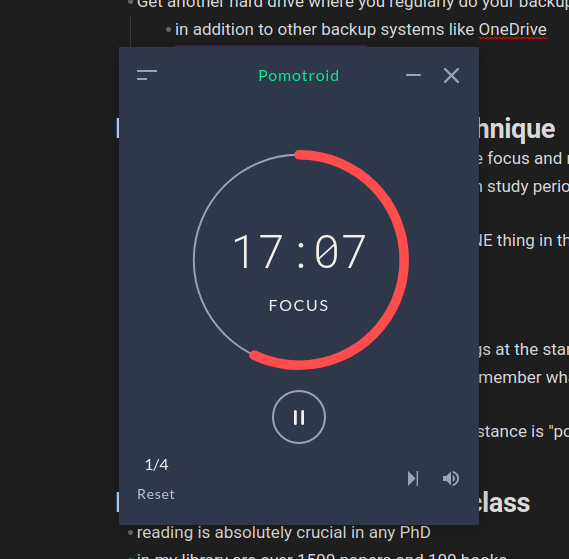
Hack 3 - Take a speed reading class
Reading papers is absolutely crucial in any PhD or scientific position. In my library are over 1500 papers and 100 books. I used to be slow reader and found myself having to read passages over and over again because I was paying attention. An absolutely crazy thing that I learned is this one: the best way to avoid drifting off when reading is… reading faster! This was so counter-intuitive to me, but it actually works! Your brain is absolutely focused on the text at hand and will not drift off as easily.
There are courses that help you read faster and memorize more at the same time. If you allocate a day per week on reading, and increase your reading speed by 20%, you will save 2 months of time in a 4-year PhD program (neglecting the other positive effects like avoiding drifting off and memorizing better).
I took a class with Iris Reading (not affiliated) but there are probably many other courses out there. I found this to be well worth the money.
Hack 4 - Boost your note taking
Writing proper notes is critical to store, find, and recall all the information that we learn during our PhD, and here you can really supercharge your note taking by spending some time developing a system that works for you. Number one is the tool. I use Obsidian and I am very happy, but other tools like OneNote also work well and you will have to try out which one you like best.
What’s more important in my experience is how you take notes… In the beginning, I simply summarized every paper I read. But this did not really make sense. Our brain needs connections, so a better approach is to collect information on a given topic and link multiple papers together. Furthermore, you can link related notes. See my example below. This also helps in your writing process because you have all related information connected.
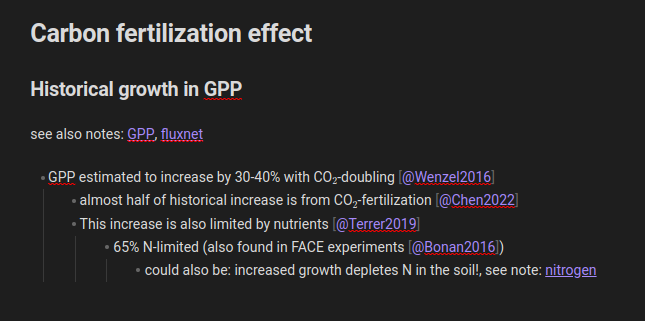
An additional tip: Take notes in every meeting. Then you can always look back, e.g., at what your advisor told you or what was decided on in a group. This will also help you pay attention during a meeting and not doze off.
Hack 5 - Use Anki to remember everything
Yeah, nowadays we can look everything up very quickly. But it does take time and in discussions you want to immediately know the facts by heart. Furthermore, you want to be able to immediately validate or challenge others’ claims. For instance, if you read a paper stating how much carbon is stored in the world’s forests, you want to immediately be able to validate that (it’s 860 GtC by the way, I know that because I am using Anki).
Anki is a free flashcard system that works on your phone or computer. The flash cards you give it to it will be shown to you in a spaced repetition fashion – stuff that you easily know will only be asked in the far future. Things that you struggle memorizing will re-appear very soon. This is based on science, showing that the best time to look at a note again is right at the point where you’re about to forget it. This is what Anki does.
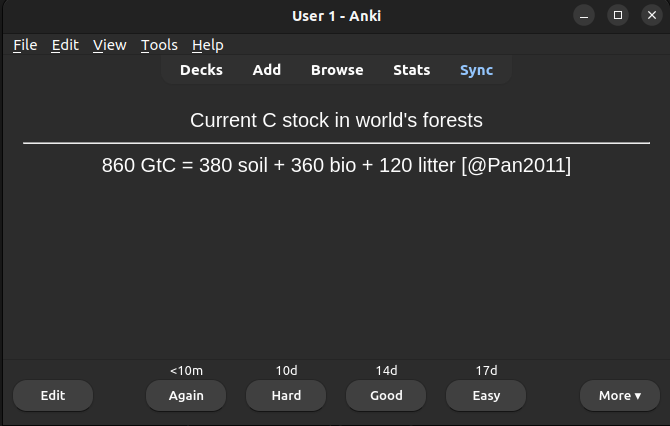
The best part is, you can include it in your note taking tools, for instance Obsidian, see the example below. I only need to write #flashcard to let the Obsidian plugin know that the lines before and after should be exported into a new flashcard with Anki. Creating the flashcards also is a first very helpful task in making the information more memorable. Apart from important numbers you can also add the citation to most important things. Then you will easily remember in which paper something was mentioned (for the forest carbon, its Pan et al. (2011), by the way =D).
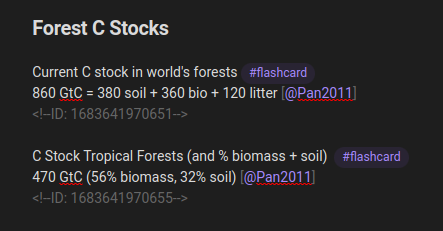
On a side note, Anki also offers pre-made flashcards like “Spanish 5000” which can help you learn pretty much anything, hablar español por ejemplo!
Hack 6 - Learn to say “no”

This is a complicated one. But I think it’s important. Every “no” you say to something means you can focus on more important things and avoid getting off track. So, even though it might be hard, you sometimes have to say no…
- to your supervisor
- she/he will not like that, but maybe you need to focus on something
- perhaps you can formulate it like “well, I can do task X by next week, but this means that I will not be able to finish Y by next week.”
- to your co-authors
- remember, it is extremely easy as a co-author to suggest things you could do, papers you should read, and so on
- but you don’t have to do all these things
- you can always say: “this is a great comment, I will keep this in mind for a follow-up study”
- to side-projects
- there is always too much interesting stuff to do
- to yourself
- it might be heart-breaking, but it will often happen that stuff you worked on for a long time will go into the trash bin.
- you can not cling to everything you did, sometimes you have to face it and say “no, I simply cannot use this for the paper, it has to go”
Hack 7 - Take a writing class
Even with ground-breaking results you probably need to properly write them down to have the journal accept it for publication. And let’s face it, our results are often rather incremental, especially during the beginning of a PhD… So, you want to make sure that the quality of your writing is good!
When I review a paper for a journal, and I see bad grammar, poor formatting, and ugly figures, I can’t help but think that this work is probably not gonna be great (to be honest, this often turns out to be true). You should avoid this at any cost! The writing and presentation of your results should be impeccable!

Writing is hard, so invest some time to get better at it. There are many books out there to help, I have come to like these two:
- Cargill and O’Connor - Writing Scientific Research Articles
- Joshua Schimel: Writing Science: How to Write Papers That Get Cited and Proposals That Get Funded
You could propose in your group to make a reading group for the books! There are also classes offered online, for instance by Nature Masterclasses (not affiliated).
Your first paper is gonna take forever to write anyway. Taking time to improve your writing will be well-invested time.
Hack 8 - Use AI tools
AI is out there and if you’re not using it you are giving yourself a competitive disadvantage. One could write a whole book on AI tools and how to use them for science, so I will not go into detail here. quillbot is a helpful tool to paraphrase text, as is ChatGPT. I have found jenny.ai to be a good tool to write introductory text, providing you also some suggestions for papers to cite. What is extremely important here is that, for instance with ChatGPT, you cannot trust it in scientific questions. It will literally make up papers that do not exist and happily provide you with information from these papers and even a made-up DOI. So be careful!
One tool that I have only recently started to use but already found incredibly useful is scite. Since I do not have enough knowledge yet, I would like to refer to this YouTube video that explains nicely how this tool can boost your research, for instance by finding sources for a claim, or by showing that there are papers contradicting a given one. This can be incredibly helpful.

Again, with all AI tools: make sure you doublecheck the information these tools provide to you!
Hack 9 - Invite yourself to other groups
Science builds on collaboration and papers nowadays often have dozens of co-authors. So, to get more input, and also to develop a standing in the science community, you want people out there to know you. This is also important to score a job after your PhD! Consequently, you need to network. And you supervisor probably does not have money to send you to every conference there is.
But in times of online or hybrid meetings, you can easily score a little presentation at another group! If you have something interesting to say this is a win-win situation! You can just write someone from your group saying “hey I see you are doing something similar, perhaps we can profit from each other’s work. I’d he happy to give a presentation on my latest results in your group meeting”. I have found that this usually works. Especially if you have published something that you can refer to. Research groups are always happy to get new inputs and make collaborations, so you can profit from this as well =)
BTW, this also holds for exchange visits at other groups. Inform yourself of possible funding from your home institution.
Conclusion
I have shown you 9 hacks that helped me during the years of my PhD (and after). They cover aspects of data handling, reading, note-taking, writing, and networking. Hopefully, some of these hacks are also useful to you and I sure hope there were some that you wouldn’t have thought about. Of course, everyone is different, but I think the points raised here are pretty important for anyone working in science.
Wishing you good luck on your PhD!
Enjoy Reading This Article?
Here are some more articles you might like to read next: